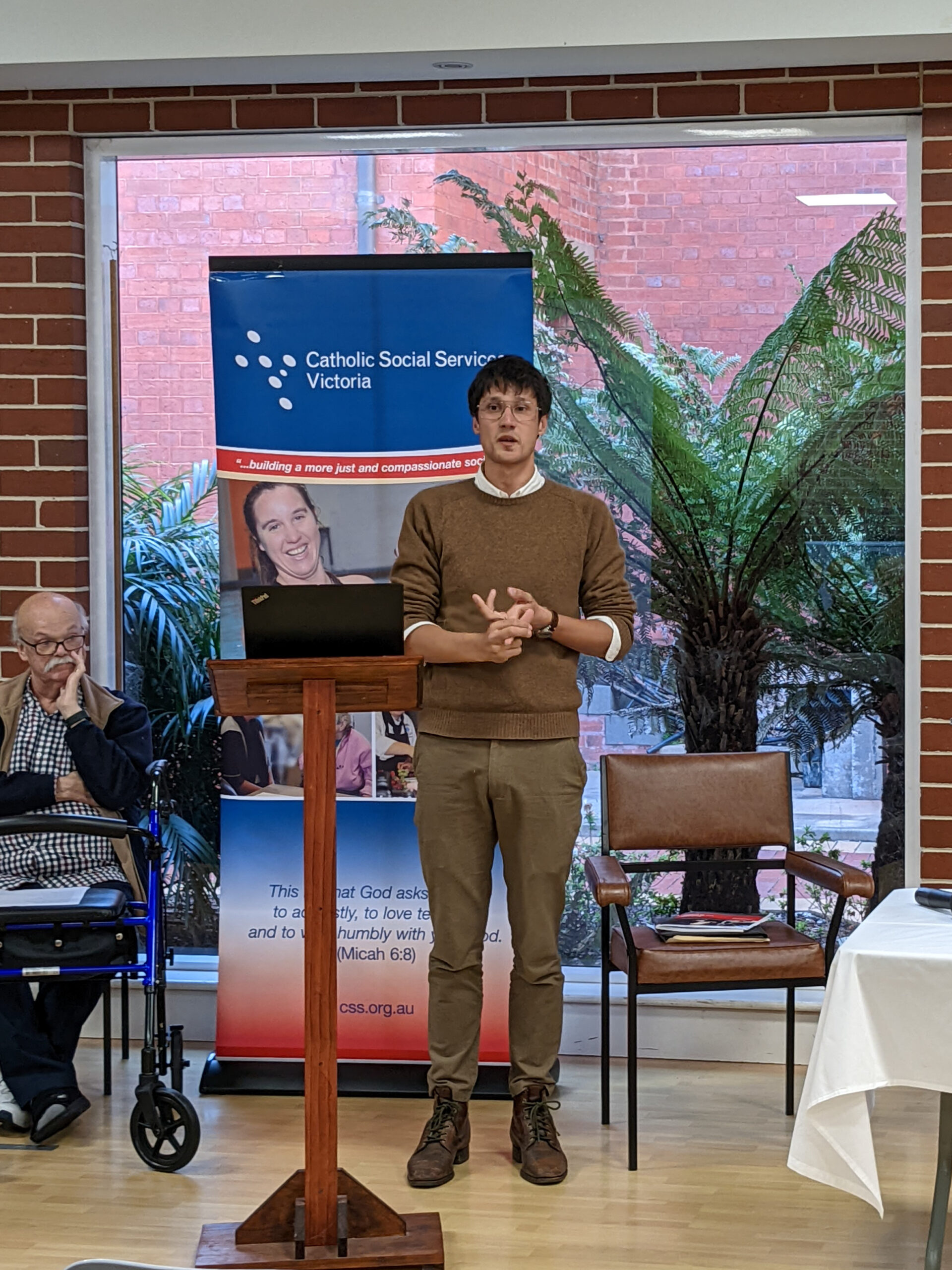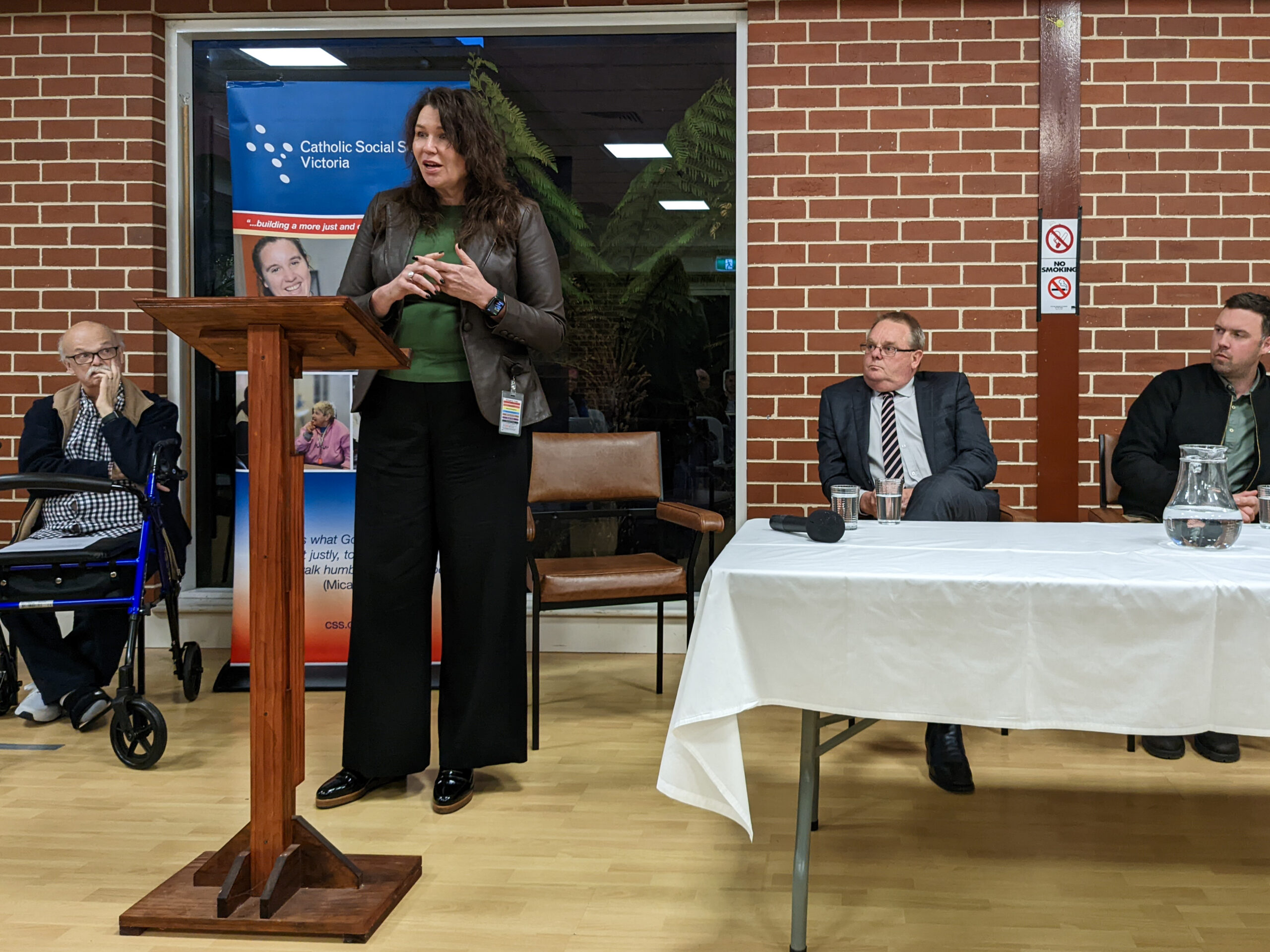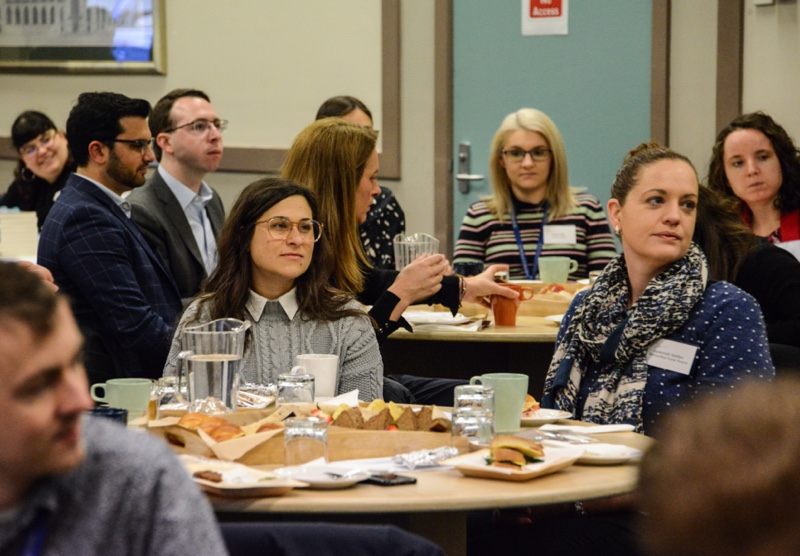This media release follows the Regional Matters forum held in Bairnsdale on Thursday 29 September and provides an overview of the key discussion points on the night.
Shortage of housing, increased homelessness and associated needs, floods, fires, the COVID pandemic, and inflation are all compounding what is already a difficult time for many who live in the Gippsland region of Victoria, in the state’s east. In a recent forum hosted by Catholic Social Services Victoria (CSSV) at St Mary’s parish centre in Bairnsdale, more than 30 locals attended to hear from members of parliament and experts working in social services in the area, to discuss what’s important to them leading up to the Victorian state election on 26 November.
The forum, Regional Matters, is the first of three held in Victoria by CSSV, the peak body that represents 43 social services members from across the state, with the next two being held in Bendigo on October 6 and Horsham on October 20.
Guest speakers at the forum included Cath McMahon, retiring president of the St Vincent de Paul Society Bairnsdale Conference; Cherie Draper, a Microenterprise Coach with Good Shepherd Australia New Zealand; Anne-Maree Kaser, CEO, Gippsland Lakes Complete Health; The Hon. Tim Bull MP, Member for East Gippsland; and Tom McIntosh MLC, representative for the Eastern Victoria Region in the Victorian Legislative Council. Members of the East Gippsland Shire Council were invited to join the panel, however, both the Mayor and Deputy-Mayor were apologies.
Joshua Lourensz, CSSV Executive Director said the forums are about ‘teasing out the issues and listening to the community’ in order to ‘work to address challenges while being informed by the great work already happening by people in the community’. He referred to the Dropping off the Edge (2021) research released by Jesuit Social Services together with their Centre for Just Places which shows that complex and entrenched disadvantage is experienced by a small but persistent number of locations in each state and territory across Australia, including parts of Gippsland.
‘Increasing costs and changes due to the pandemic, including the movement of people from Melbourne and interstate to the regions, is compounding the lack of housing and impacting the homelessness situation,’ he said.
‘In Melbourne there’s been a 10% increase in house prices, while in the same period in East Gippsland there’s been an increase of 35% as well as an increase in rental prices in the area. People are struggling to find places to live.’
Anne-Maree Kaser explained that she struggled to find accommodation when first appointed as CEO. ‘In my first four months of this role I stayed in hotels and serviced apartments, and only secured a place through a personal connection. I now pay $600 per week,’ she said. ‘But people with less opportunity [than me] are being squeezed out of the community.’
Cath McMahon explained that the local Vinnies, which receives no government funding at all (rather relying on donations and revenue from its opportunity shops), covers halfway between Bairnsdale and Sale, right up to the NSW border and sometimes beyond. ‘In a nutshell, our community is in crisis,’ she said. ‘By far the greatest issue for us at the moment is the housing crisis and subsequent homelessness.’
‘From 1 January 2022 until 28 September 2022 we have interviewed 173 homeless people (112 men and 61 women). Of those, we have had 27 later return for more assistance as they were still homeless and in our area. And these statistics don’t reflect the other agencies in town assisting the “homeless”, so the overall statistics would be much higher.’
‘I have been blown away by the increase in homeless people knocking on our door. We have a beautiful new assistance centre at 92 Macleod Street. Yes, we can provide food, clothing, shower and laundry facilities and a multitude of other assistance, but with all our best attempts we cannot provide what they really need—a roof over their heads. All we can do is support them in their homelessness.’
Cherie Draper of Good Shepherd Australia NZ agreed that there is a ‘deficit of resources, houses, and money in people’s pockets’ in the region. ‘Let’s not forget the small things,’ she said, ‘Simple things, like access to children’s clothing, are dragging people down. Loy Yang [power station] is shutting down 10 years early; the forestry and fishing industries have been impacted. Industries need support in this area.’
Tom McIntosh MLC, who grew up in Victoria’s western Mallee region, was keen to do ‘more listening than talking’ at the forum. He acknowledged that the further the distance from Melbourne, the bigger the disadvantage. ‘Activism and social justice have always been a part of my family,’ he said. ‘The best of the Catholic Church does incredible things supporting people and families. The word that has crystrallised everything for me is “equality”—everything we look at, we need to ask, “what is this doing to improve equality?”’
Questions and discussion among those who attended focused on the critical housing shortage, and what can be done to address the immediate needs of those who are homeless. There was also discussion around the ageing nature of volunteers, who fear they can’t continue to provide the same level of support to the community in coming years.
In addressing these issues, the Hon. Tim Bull MP said, ‘Availability and affordability are intimately connected. Council is struggling to get through subdivision and planning approvals. The State Government could assist with a fast-track process. It’s not an overnight fix, but it will assist in supply.’
He said, ‘East Gippsland has had the perfect storm—long drought, bushfires and COVID.’ Other contributing factors to homelessness, he said, were the fires—400 houses burnt down, so many local residents are occupying rentals, and during the COVID lockdowns, Melbourne residents bought homes or took rentals to avoid city lockdowns. There have also been changes to tenancy laws, with increased standards required for rental properties, landlords are faced with bills to bring properties up to scratch. Many have chosen to sell, with the houses bought by out-of-towners.
‘I’ll give credit to the Labor Government for investing $5.3 billion in building new homes. But there are 50,000 people on the public housing waiting list and this is growing,’ Mr Bull said.
There was consensus in the room that the issues needed to be worked on together, with local, state, and federal government input, and from both government-funded organisations and others.
‘Given that funding for some bushfire recovery projects is winding up, we need to seriously look at where money can be spent to support the community in an ongoing away, because the issues haven’t gone anywhere,’ said Josh Lourensz. ‘It’s clear that people haven’t recovered from the bush fires let alone the other compounding issues that the community is facing.’
‘There was consensus at the forum that these issues can’t be addressed on their own. We need to work together on this, from every angle. We need good collaboration between government, social services organisations, the Church, and the community. We need to talk and listen to each other, with the government being willing to refuse the allure of cookie cutter approaches and meet specific needs in the regions.
‘Though it’ll be a tough time, we are hopeful about the next three years and seeing positive change. It’s an important time to have an election and affirm a commitment to those on the margins. We need to rebuild, recalibrate, and reimagine,’ Josh said.
For more information, contact Josh Lourensz, CSSV Executive Director.












Join our mailing list
Keep up to date with latest news, information and upcoming events.
We respect your privacy, as outlined in our privacy policy.